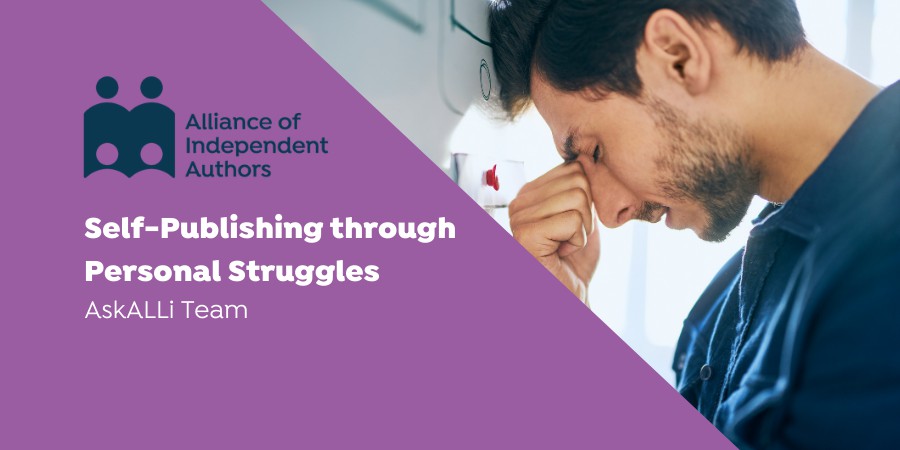The last year has been exhausting, and difficult for millions if not billions of people. But there are so many people who have personal struggles on a day to day basis without the added pressures of global pandemics. Today, the Alliance of Independent Authors AskALLi team is talking to some of its members who have continued self-publishing through personal struggles. We listen to their inspirational stories and find out how they've overcome their struggles to publish. With thanks to Angeline Trevena, Jack Lench, Rachel McLean and Debbie Young for their contributions to this post.
Self-Publishing through Personal Struggles: Publishing through Poverty

Angeline Trevena, Author
Angeline Trevena writes contemporary fantasy and soft sci-fi with a feminist dystopian edge. She also writes worldbuilding guides for authors, co-hosts a podcast and manages events. Find out more about her books here and on her website here.
I grew up working class. One of the poor kids. Hand-me-down clothes and second-hand shoes. Poverty as recognized by the UK government, and recognized by the other kids at school.
When I decided to try my hand at self-publishing, I began with a budget of zero. I knew that I had to bootstrap this. So I called in every favour I could. A writer I knew from social media taught me to hand-code an ebook using Sigil. My brother, a graphic designer, created the cover for a ridiculously low fee. My beta readers were picked from friends, family members, and my online network of fellow writers. I couldn’t even dream of affording an editor.
When people tell you that every book absolutely must be professionally edited, however good that advice is, however well-meaning, it comes from a place of privilege. I didn’t have a few hundred up to a few thousand spare pounds to pour into this. I was wondering how to keep the electric on and food on the table.
And this is how I continued in my publishing career. I read and watched everything I could about self-editing, but still, every time it came up, I felt less than. People argued that no book should ever be published without a professional edit. Promos on BookFunnel demanded proof of professional editing before accepting a book. I’ve seen writers without editors shamed, ridiculed, and belittled online. It’s the kind of thing that can stop someone writing altogether.
We live in amazing times. Anyone can publish a book. For so long, published and recorded voices have been policed. And voices have been silenced based on gender, race, sexuality, socio-economics. Marginalized voices have been silenced throughout all of history. They’ve been ignored, pushed aside, hidden, silenced, and lost to history.
But those voices don’t need to be lost anymore. We live in amazing times. I don’t want anyone to let their demographics stop them from publishing. I want those voices. I want those stories. I want that legacy to finally exist. To be recorded and preserved.
You can bootstrap your publishing business. And you can make a success of it. You just have to find the workarounds.
- Find critique partners: Work closely with other writers at each stage of your book. Critique each other’s work, help each other to improve.
- Call in favours: People always say not to use friends and family as beta readers, figuring them to be people that will be nice to save our feelings. But if you have friends and family members you can trust to be brutally honest (I’m sure we all have them!), then use them.
- Do a skills swap: If you need some help with a particular part of publishing, think about what you can do in return. Trade skills with others.
- Ask for advice: There are lots of people publishing with a small or non-existent budget. And when you’ve learnt how to feed yourself for a week on just £2.50, you can come up with clever ways to side-step publishing costs. Ask for recommendations, and alternative ways of doing things.
- Attend free webinars and challenges: A lot of the things I’ve learnt by watching free webinars. They all have a sales pitch at the end, but the information you can get without parting with any money can be really helpful.
- Start Small, Scale up Slowly: “Do what you can, with what you’ve got, where you are.” A quote from Squire Bill Widener, referenced by Theodore Roosevelt. This quote is my mantra. If you wait for the perfect time, or that magic money-pot, you’ll never publish, and your voice will be lost.
Most importantly, don’t ever give up. You just never know what’s around the next corner. I couldn’t have imagined the places my writing would take me, or the things it would bring me, but it has.
Self-Publishing through Personal Struggles: Publishing with Dyslexia

Jack Lench, Author
Jack Lench had a wonderfully happy childhood in Suffolk. He managed a 200 acre farm in Saudi and travelled to most parts of the world as an engineer. He's also lived in Italy and run many diverse businesses over the years, from selling quality Persian rugs at antiques fairs to an exhibition and event company. Now he writes books and short stories as a hobby and spends his life behind the wheel of a van crossing Europe as a courier/driver. Find out more about Jack on his website.
Q. What personal struggles have you faced on your path to publishing?
I look back on my formative school years with unease and sadness. I hated English lessons at school. The English teacher didn't like me either. He said that I never checked my work for spelling and grammar mistakes so he called me ‘lazy' and a ‘dullard' (Suffolk for ‘dim-witted'). Strangely, whenever I reviewed my essays, I could not spot any errors. The spelling looked fine to my eyes. I was none of the things he called me and was, in fact, dyslexic. I wanted to be the same as the other kids in my class but I wasn't. I could not recognize the right spelling of words and was classified as being an ‘underachiever’ in English. I loved history and was really good at maths but the education system left me ill-equipped for any career where qualifications mattered. My skills as an engineer were later recognized and I had the opportunity to travel around the world.
Q. How did you overcome it?
I have been dyslexic all my life. It will never go away. What I have learned is to adapt my life around it. I think when a person has some kind of disability, they over-compensate in other ways to avoid being labelled as different. I have always been self-employed, always ‘paddled my own canoe’ and been relatively successful in the businesses I have run. I can’t spell but that does not mean I am without either intelligence or imagination.
I started writing because I was lucky enough to meet someone who loved the stories I had in my head and believed in me. She was encouraging and incredibly supportive to the point that she changed her own career from being an English teacher and retrained as a freelance editor. She edits and proofreads my books. Without her, I would not have written or self-published any books.
Q. What did you learn?
It is so important to encourage writers of any age, whatever their challenges. As a teenager, I read avidly and was inspired by classics like Moby Dick, The Old Man and the Sea and Dombey and Son. Parents should read to children to inspire them to become interested in stories, while teachers should encourage children to believe in their imagination and not be as dismissive as mine was.
There are so many resources now available to support people with learning difficulties. Social media has proved invaluable for promoting the resources and events available while spreading the word that there is help out there for empowering people to reach their full potential. If something has affected your confidence to write, don’t let it stop you. I have self-published two of my books and have another five in the pipeline. Your imagination is your gift!
“You cannot change what you are, only what you do!” (Phillip Pullman)
Self-Publishing through Personal Struggles: Publishing as a Parent

Rachel McLean, Author
Rachel McLean writes thrillers and crime, including the bestselling DI Zoe Finch series set in her home city of Birmingham. She lives in (guess where?) Birmingham with her two sons and three cats and became a full time writer in January 2021. Find out more about Rachel on her website and instagram.
Self-Publishing through Personal Struggles: Publishing through Disability

Debbie Young, author
Debbie Young is the author of two series of cozy mystery novels, each with a book shortlisted for The UK Selfies Awards. She also writes short stories, guidebooks for authors. articles for writing magazines and blogs, and humorous columns for magazines that serve the local community in the Cotswolds, where she founded and directs the Hawkesbury Upton Literature Festival. You can find out more about her on her website and Facebook.
Self-Publishing through Personal Struggles: Mental Illness

Author and ALLi News Editor, Dan Holloway
Dan Holloway is the author of Our Dreams Make Different Shapes, about creativity and being different. He is a member of the Money and Mental Health Policy Institute’s Advisory Board, speaker at the 2017 Oxford Disability Lecture, and was shortlisted in two categories for the first Vice Chancellor’s Diversity Awards at Oxford University. He has been campaigning on, and speaking and writing about, mental health and mental illness for a decade and a half. He is also ALLi’s news editor.
I write a lot about my experience of mental illness and neurodivergence (I am bipolar, ADHD, and dyspraxic), in performance poetry and non-fiction as well as in my role as an activist and a consultant on issues of accessibility. And I base a lot of my writing on my experience of mental illness – the characters in my fiction have lives whose shapes bear similarities to mine. There is a familiarity to writing like this. A feeling of honesty, transparency, authenticity and, yes, a comfort.
And that is, I think, what we think about most when we think about people who are mentally ill who also write. But like all areas that are slightly mythologised and given to tropes, the reality is more of a relentless mundanity. And a struggle to be understood that is made worse by the tropes. Yes, I am bipolar. Yes, I have been Creative Thinking World Champion 3 times. No, the two are not linked. The link between genius and madness is a myth, and not a neutral (definitely not a positive) one at that – it is a fetish. And just as – like most disabled people – I don’t want to be your inspiration (you can read some reasons why here), I don’t want to be the object of your fascination either.
What I want to talk about here is that mundanity, that disappointment. Because if there are other writers out there like me, the one thing they will want to know more than any other is that they are not alone.
One of the most soul-destroying but all-too-familiar experiences when you are disabled is to find a community where you seem to fit in, where you are told you fit in, where you are embraced with assurances that “this is a place for outliers and outsiders, for the depressed and dispossessed” – only to find, in every encounter you have, that you do not fit in. That you are still an outsider.
There must be a word for it – the heaviness that comes from experiencing the inevitable disappointment that comes after the promise of empathy followed by the practice of misunderstanding, and with it an increased sense of isolation.
There are times when the writing community has felt like that, and before I talk about the wonderful spaces I’ve found, I want to talk a little about the times when I have felt that writing was not a world where I belonged.
Most of the time it comes back to well-meaning generalisation. If you look at advice on being a successful writer, some key themes emerge. But the one that’s more fundamental than any of them is consistency. Make time to write every day. Write-publish-repeat. Just keep going. Whatever the angle,m the substance is the same – be consistent.
I wrote an article on why appeals to consistency are so damaging – and so often so reflective of privilege that whatever they are aimed at, whether that’s writing or fitness, or any kind of self-improvement, if we were to take them seriously many of us would have to conclude there’s a whole world of achievement and enjoyment that’s just not for us.
That’s a lot of tell, I know. You want me to show. It’s interesting that whenever I speak to neurodivergent readers and we end up talking about writing and craft and so on, one of the first these many will say is they don’t understand the obsession with “show don’t tell.” But that’s an aside – something else you get a lot of from me. ADHD loves asides.
Most of my talks are made up of asides – another thing common among ADHD speakers, and something that has always appealed to me as an audience member, for reasons that only understanding who I am has made clear. The way plot-by-asides-works is more like creating a detailed picture than a traditional narrative. It works in layers. People who use computers for graphic design will be very familiar with this. If you add each filter, each colour one by one, it’s only at the end, when you step back, that you see the picture. As you go, you really have very little idea. You just absorb what’s coming into your senses and trust the artist, and at the end that trust is repaid with something beautiful. To me that feels like such a natural way of telling stories, conveying information. And it allows you really to think about what you are taking in – that’s the problem with a linear narrative. Aside from being counterintuitive for those of us who do not think in lines, it shuts off possibilities. It presents information with clear instructions on how to understand it, taking away the role of pondering, of meandering thought and playful exploration that is the most enjoyable part of encountering information.
There was a period from the mid 90s when this method of storytelling became almost mainstream. I first encountered it in Kieslowski’s Three Colours trilogy, but it was there in many of the iconic films of the era – Magnolia, Short Cuts, Sliding Doors surfacing it in the mainstream, and epitomised in the classic Run, Loila, Run. It was also a technique many of our finest TV writers used. Jimmy McGovern and Kay Mellor leap out. Each would come at a story from different angles, take different paths into the woods, as it were, then come at the same trees from different paths and show us a story in its full dimensions. And it was there in the written and spoken word as well, whether the long form poems of Kate Tempest or MarlonJames’ Booker Prize Winning A Brief History of Seven Killings, which was the point at which mainstream newspaper coverage of the arts started using the word “polyphony”.
I think the reason we are seeing this step back from the mainstream has to do with something I report on here. Subscription serialisation, and AI algorithms that predict success both favour the hero’s journey model of storytelling. Where Jimmy McGovern, or the writers of The Wire, would be given a budget for a whole series and could afford to come back and write the same story each episode, adding something new each time, the return to the rush to keep people turning the page, unlocking the next content, means there isn’t the space to breathe in that way. For those of us whose minds grind against linear narrative, the tide is receding.
Or maybe it has moved elsewhere. The longform layered narrative distilled from pieces has found a new home in hypertext. Projects like Cicada 3301 down to even the most basic creepypasta have shown that there is still a place for layering, for what I would call a Cubist narrative style.
If this were a TED talk I would pepper it with anecdotes. Maybe you would like to know how it feels to enter a chat forum and find everyone welcoming you with one text and showing they don’t understand you with another? Maybe you would like to know how it feels to see the slots you used to fill at gigs filled by others because you’ve been too sick to stay top of the organiser’s mind for the past two years while they have had the health to be consistent? Maybe you would like me to put my arm around you and whisper words in your ear that take you with me into the dark corner where I am sitting with only an empty page and utter loneliness for company?
Maybe you would like to know. OK – if the way I’ve explained it to you so far is something you haven’t really followed, something you don’t quite grasp although you can kind of see I might be trying. If that’s what you feel, that’s the closest I can come to explaining to you how it feels every day to be me in a community I love being part of that doesn’t quite understand me. Isolation, that isolation of the disabled writer, does not stem from being alone. It stems from being surrounded by people who do not quite understand.
But the indie world is such a broad landscape that there are spaces even for someone like me. The first place I have ever felt creatively not alone was in the dark recesses of internet writing forums. Slowly a group of us who each did very different things began to come together and by the end of the Noughties we had starting gigging together in meatspace under the banner Year Zero Writers. We kicked off at Brick Lane’s iconic Rough Trade Records and for a few glorious years we made poetry, zines, novels, and mayhem at festivals, fringes, bookshops, theatres, museums and cafes around the UK.
And that, finally, brings us back to layers. Because the indie writing community has many layers. And our space within each layer will look different. At its broadest the community is one where many parts of me will feel isolated and disappointed if I look for the things many people find there. But if I look in different ways I will find those parts of people working for the same things I am. The key to finding space as a disabled writer is to learn what is not there and be confident in accepting it’s not there, and enjoying what is. I don’t write the same way you do. What works for many does not work for me, and that’s OK. It doesn’t make me a lesser writer. And from communities in return, what makes them accessible to us is an awareness and acknowledgement of what is not there as much as what is. The humility not to generalise when giving advice, the humility to say I don’t understand you but it’s great to have you here anyway. And then we can each gain something from each other.
This is a link to the video of my 2016 poem Nobody’s Inspiration, written for the Oxford Disability Lecture.





Excellent article with inspiring examples!